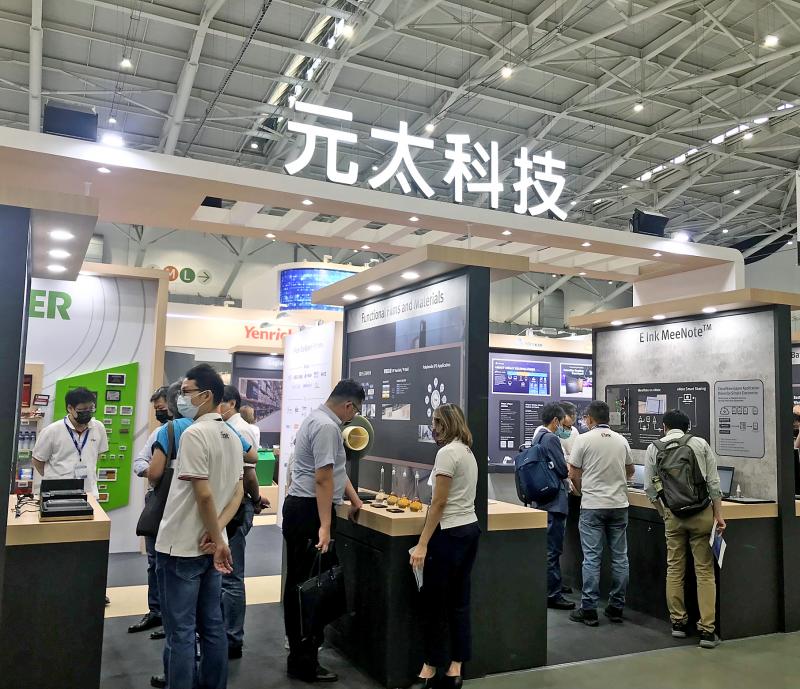E Ink Holdings Inc (元太科技) yesterday said it would further expand capacity to cope with robust demand for e-paper displays used in e-readers, e-notes and electronic shelf labels, as the COVID-19 pandemic and rising inflation have not dampened consumer demand.
Although rising inflation is weakening companies’ purchasing power, E Ink said that its customers have not scaled down orders for e-paper displays used in e-readers.
“Reading is still the most affordable leisure activity that people have,” E Ink CEO Johnson Lee (李政昊) told an online investors’ conference in Taipei.

Photo: Chen Mei-ying, Taipei Times
As e-books are less expensive than paper books, “we have so far not seen a slowdown in demand,” Lee said. “We are seeing quite robust demand.”
Demand was also aided by E Ink’s launch of better-performing colored e-paper display technologies to replace e-readers with monochromatic displays, Lee said.
Large-scale retailers are more rapidly adopting electronic labels due to price volatility and inflation, as well as higher labor costs and worker shortages, he said.
E-papers used in electronic labels, which replaced those used in e-readers, became E Ink’s biggest revenue contributor last quarter, accounting for 52 percent of the company’s total revenue of NT$5.96 billion (US$200.61 million), the company said, adding that this was a significant increase from 40 percent a year earlier.
To meet demand, E Ink said that it would double this year’s capital expenditure to more than NT$4 billion.
The firm is to launch three new production lines for e-paper displays this year, Lee said, adding that another new production line would be postponed until the first quarter of next year because delivery of the equipment had been delayed.
To boost production, E Ink might convert part of a new office building into a manufacturing site, he said.
The office building is to open next year, he added.
Lee said that the impact from COVID-19 lockdowns in China has been negligible.
The large-scale shutdowns in Shanghai did not spread to Jiangsu Province’s Yangzhou, where E Ink operates an e-paper display module factory, he said.
Transportation snarls have elevated logistics costs, but that is manageable, he said.
E Ink reported that net profit in the first quarter increased 25 percent year-on-year to NT$1.46 billion — the second-highest in the company’s history — compared with NT$1.17 billion a year earlier, while earnings per share rose to NT$1.28 from NT$1.03 a year earlier.
Operating profit margin jumped to 24 percent, from 22 percent a year earlier.
Gross margin this quarter is likely to decline, as shipments of lower-margin e-reader modules would increase ahead of the peak season in the third quarter, the company said.
Revenue in the first quarter rose 14 percent annually to NT$5.96 billion, the highest in 11 years, it said.

‘SWASTICAR’: Tesla CEO Elon Musk’s close association with Donald Trump has prompted opponents to brand him a ‘Nazi’ and resulted in a dramatic drop in sales Demonstrators descended on Tesla Inc dealerships across the US, and in Europe and Canada on Saturday to protest company chief Elon Musk, who has amassed extraordinary power as a top adviser to US President Donald Trump. Waving signs with messages such as “Musk is stealing our money” and “Reclaim our country,” the protests largely took place peacefully following fiery episodes of vandalism on Tesla vehicles, dealerships and other facilities in recent weeks that US officials have denounced as terrorism. Hundreds rallied on Saturday outside the Tesla dealership in Manhattan. Some blasted Musk, the world’s richest man, while others demanded the shuttering of his

ADVERSARIES: The new list includes 11 entities in China and one in Taiwan, which is a local branch of Chinese cloud computing firm Inspur Group The US added dozens of entities to a trade blacklist on Tuesday, the US Department of Commerce said, in part to disrupt Beijing’s artificial intelligence (AI) and advanced computing capabilities. The action affects 80 entities from countries including China, the United Arab Emirates and Iran, with the commerce department citing their “activities contrary to US national security and foreign policy.” Those added to the “entity list” are restricted from obtaining US items and technologies without government authorization. “We will not allow adversaries to exploit American technology to bolster their own militaries and threaten American lives,” US Secretary of Commerce Howard Lutnick said. The entities

Minister of Finance Chuang Tsui-yun (莊翠雲) yesterday told lawmakers that she “would not speculate,” but a “response plan” has been prepared in case Taiwan is targeted by US President Donald Trump’s reciprocal tariffs, which are to be announced on Wednesday next week. The Trump administration, including US Secretary of the Treasury Scott Bessent, has said that much of the proposed reciprocal tariffs would focus on the 15 countries that have the highest trade surpluses with the US. Bessent has referred to those countries as the “dirty 15,” but has not named them. Last year, Taiwan’s US$73.9 billion trade surplus with the US

Prices of gasoline and diesel products at domestic gas stations are to fall NT$0.2 and NT$0.1 per liter respectively this week, even though international crude oil prices rose last week, CPC Corp, Taiwan (台灣中油) and Formosa Petrochemical Corp (台塑石化) said yesterday. International crude oil prices continued rising last week, as the US Energy Information Administration reported a larger-than-expected drop in US commercial crude oil inventories, CPC said in a statement. Based on the company’s floating oil price formula, the cost of crude oil rose 2.38 percent last week from a week earlier, it said. News that US President Donald Trump plans a “secondary